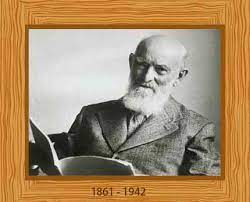Robert Bosch: I don't pay good wages because I have a lot of money; I have a lot of money because I pay good wages
Robert August Bosch is a German inventor, engineer and industrialist, who lived between 1861-1942, as well as the founder of Bosch (Robert Bosch GmbH), one of the world's leading engineering companies.

Announcing its name all over the world with its inventions, Bosch has won the appreciation of the masses with its social revolutions and care for workers' rights.
Robert Bosch was born on September 23, 1861, in a town of Ulm, Germany, as the eleventh child of a family of twelve children. His father, Servatius Bosch, ran a hotel called Gasthaus Krone and was a member of the Masonic society. The Bosch family attached great importance to education. Between 1869 and 1876, Bosch attended a technical secondary school in Ulm, then studied precision mechanics. After completing his training, he volunteered for one year in the No. 13 Württemberg Pioneer Corps. After a year, despite the advice of his bases, he decided not to advance in this field and to return to his profession. In the seven years following this decision, he had the chance to work with Siemens brothers in England and Thomas Edison in America.
Returning to his country after working in many companies in different countries, Bosch started his work by establishing the "Precision Mechanical and Electrotechnical Workshop" in Stuttgart in 1886. In 1887, it achieved its first success by making significant improvements on the magnetic ignition system patented by Deutz, one of the world's largest engine manufacturers. The system designed by Bosch could only be used to ignite fuel going to stationary gas engines. Arnold Zähringer, who worked at Bosch in 1897, succeeded in adapting this system to high torque car engines and gave a sigh of relief to the young automotive industry, which was struggling with a lot of problems at that time. In 1902, Gottlob Honold, another successful Bosch engineer, invented the spark plug working under high voltage as a part of the magnetic ignition system. This invention was an important turning point for internal combustion engines.
Over the years the Bosch company continued to expand its market and by 1913 they were able to operate on every continent. Bosch, which took important steps towards institutionalization in 1917, accelerated its growth thanks to the military agreements it made. At the beginning of the First World War, almost all military vehicles were equipped with Bosch spark plugs. Of course, Bosch, who donated tens of millions of marks to the German people who were in a difficult situation, showed his patriotism and paid his debt of gratitude arising from military agreements. After the war, Bosch continued to make new contributions to the engine and automotive industry. The biggest success of the company, which designed systems such as starter, radio, horn and interior lighting for cars, in this period was to design and put into service injectors that do the same job in diesel engines as spark plugs do in internal combustion engines in 1927. In the 1920s, when the effects of the Great Depression were evident, Robert Bosch initiated a process of renewal and expansion into different areas for his company, which suffered a heavy crisis. Within a few years, the company was able to transform itself from an auto parts developer and supplier to a world-renowned electrical engineering firm.
Robert Bosch, who became famous as the first industrialist who introduced the concepts of eight-hour shifts, fair wages and social assistance for workers, in addition to his achievements in business life, began to be known by a certain group as the "Red Bosch" due to his employee-friendly reforms. Robert Bosch, who opened a hospital in addition to his donations to Germany, joined many economic committees with his liberal businessman identity and devoted most of his time to mediation between Germany and France. Although he hoped that a ceasefire between these two countries would bring peace to all of Europe, it did not turn out as he expected. Robert Bosch's mediation efforts ended with the establishment of the Nazi Government. Later, under pressure from this government, the Bosch company accepted armaments contracts and forced labor offered during the war.
Robert Bosch, who had two marriages throughout his life and had four children from these marriages, died in Stuttgart in 1942 due to an ear infection. The group of companies that bears its name today continues to work faithfully to the ideals of its founder, with more than 300,000 employees. The Bosch company, which no longer works in the field of weapons development, continues to provide high standards for employees regardless of religion, nationality or race.
